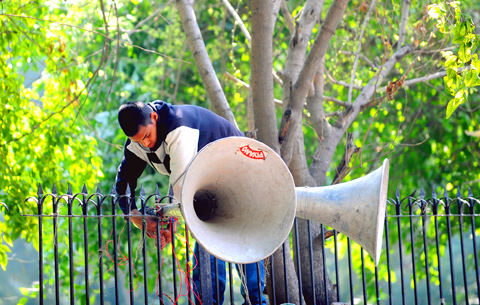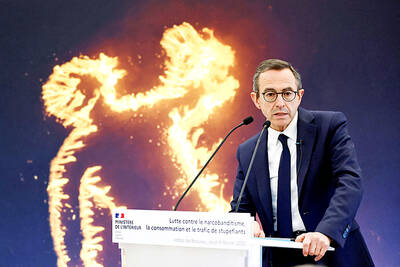By and large, Indians embrace noise. Their festivals are a riot of color and sound, weddings an exercise in high-decibel exuberance and house parties an extreme test of neighborly tolerance.
Now, however, things have reached such a pitch that the government has decided to step in, beefing up decade-old noise pollution regulations to keep the volume dial turned down.
“Stress has been laid on making the night peaceful,” the Environment Ministry said last month as it published a set of guidelines specifying when violations should be considered serious enough to merit police action.

PHOTO: AFP
The guidelines cover a variety of noise sources from construction sites and car horns, to living-room stereos and festive firecrackers.
The noise limit in residential neighborhoods is set at 45 decibels at night and 55 decibels in the day — roughly equivalent, respectively, to the noise produced by soft and loud conversation.
Anyone found to be producing noise in excess of those limits by more than five decibels should face sanction from police.
“These will give enforcing agencies more powers to implement rules as they are clear, precise,” J.S. Kamyotra of the Central Pollution Control Board (CPCB) said.
Privately, some officials admit that enforcing regulations is a much harder task than drafting them.
“Lets face it, we have been trying to stop people from smoking in public places and it hasn’t worked,” a senior control board official said on condition of anonymity. “There are laws, fines and punishments, but people always find a way to work around them and if a policeman tries to shut down loudspeakers at a religious event, he risks being lynched for daring to offend religious sentiments.”
Such skepticism is backed by the fact that no one has ever been convicted under the 2000 Noise Pollution Control Act — which promises seven years’ imprisonment to proven offenders.
With its billion-plus population, multiple religions and extraordinary social diversity, India is an almost limitless source of different, and often very loud, sounds — as any first time visitor to the country can testify.
“We Indians are a noisy lot, be it loud weddings or honking on the streets,” Delhi’s chief minister Sheila Dikshit said during a recent conference on environmental health risks.
“Silence talks to us. We do not realize this because of the amount of noise that surrounds us and noise pollution is a major problem,” Dikshit said.
Displays of wealth, power, happiness and religious faith take place, more often than not, with a high-decibel accompaniment.
“I had a rich neighbor who celebrated his son’s wedding in a park in front of my house. The music was simply deafening,” said an Indian government official, who did not want to be named. “When I asked him to turn it down as it was close to midnight, he refused, saying his son would get married only once and he didn’t want to mar the celebrations.”
During celebrations last year for Diwali, the Hindu festival of lights, the CPCB registered noise levels in some New Delhi residential areas as high as 85 decibels, which can result in permanent hearing loss after sustained exposure. Background traffic noise in Delhi can average between 85 and 100 decibels during the day.
Dipankar Gupta, a former sociology professor at Jawaharlal Nehru University in Delhi, said the growth of private incomes in India had only added to the din.
“In India, as in many developing countries, people think making a noise is their prerogative,” Gupta said. “With rising affluence, India has become more and more noisy because noise is unfortunately associated with status and power. The children of the rich and powerful think its fashionable to make the most noise.”
Environmental activists say politicians often set an appalling example, hosting or attending rallies where loudspeaker volumes are ramped up to maximum.
“Politicians assume they are exempt from the law and the police often don’t take action against them,” said Sumaira Abdulali, head of the voluntary group Awaaz (Noise) based in Mumbai. “It is only through citizens’ vigilance that we have seen a decrease in noise levels from political functions in Mumbai, but this is an uphill struggle when the law breakers are those who are supposed to be enforcing the law.”

RIGHTS FEARS: A protester said Beijing would use the embassy to catch and send Hong Kongers to China, while a lawmaker said Chinese agents had threatened Britons Hundreds of demonstrators on Saturday protested at a site earmarked for Beijing’s controversial new embassy in London over human rights and security concerns. The new embassy — if approved by the British government — would be the “biggest Chinese embassy in Europe,” one lawmaker said earlier. Protester Iona Boswell, a 40-year-old social worker, said there was “no need for a mega embassy here” and that she believed it would be used to facilitate the “harassment of dissidents.” China has for several years been trying to relocate its embassy, currently in the British capital’s upmarket Marylebone district, to the sprawling historic site in the

A deluge of disinformation about a virus called hMPV is stoking anti-China sentiment across Asia and spurring unfounded concerns of renewed lockdowns, despite experts dismissing comparisons with the COVID-19 pandemic five years ago. Agence France-Presse’s fact-checkers have debunked a slew of social media posts about the usually non-fatal respiratory disease human metapneumovirus after cases rose in China. Many of these posts claimed that people were dying and that a national emergency had been declared. Garnering tens of thousands of views, some posts recycled old footage from China’s draconian lockdowns during the COVID-19 pandemic, which originated in the country in late

French police on Monday arrested a man in his 20s on suspicion of murder after an 11-year-old girl was found dead in a wood south of Paris over the weekend in a killing that sparked shock and a massive search for clues. The girl, named as Louise, was found stabbed to death in the Essonne region south of Paris in the night of Friday to Saturday, police said. She had been missing since leaving school on Friday afternoon and was found just a few hundred meters from her school. A police source, who asked not to be named, said that she had been

BACK TO BATTLE: North Korean soldiers have returned to the front lines in Russia’s Kursk region after earlier reports that Moscow had withdrawn them following heavy losses Ukrainian President Volodymyr Zelenskiy on Friday pored over a once-classified map of vast deposits of rare earths and other critical minerals as part of a push to appeal to US President Donald Trump’s penchant for a deal. The US president, whose administration is pressing for a rapid end to Ukraine’s war with Russia, on Monday said he wanted Ukraine to supply the US with rare earths and other minerals in return for financially supporting its war effort. “If we are talking about a deal, then let’s do a deal, we are only for it,” Zelenskiy said, emphasizing Ukraine’s need for security guarantees